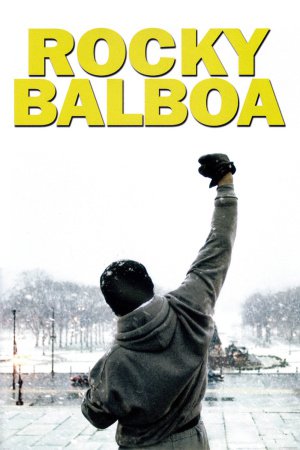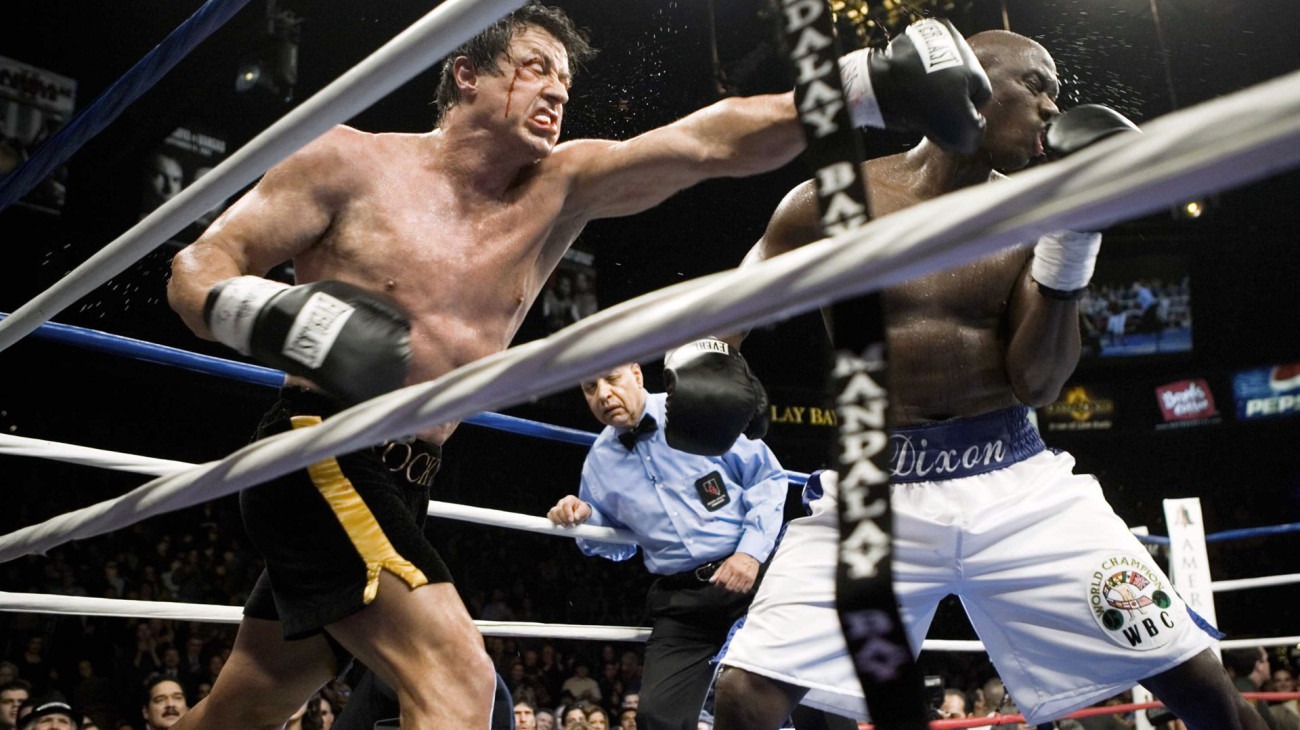
Rising up to the challenge
When we think of great writer/director/actors, most of us, I hope, will come up with names like Orson Welles, Woody Allen, Charles Chaplin, Jacques Tati. I think most of us will not think of Sylvester Stallone. And while Rocky Balboa won't convince anybody to add his name to the extremely short list of supremely talented hyphenates, it's more than a little shocking just how good he manages to be. The sixth go-round in the venerable yet horrendous franchise, and the fourth directed by the star (after Rocky II, Rocky III and Rocky IV) is, as you've probably heard by now, pretty much a fine movie. There's no doubt it's the best since the first Rocky; hell, it might even be better.
The plot is a neat metaphor for the film itself: the onetime champ, reduced to a respectable punchline, must beg for the right to get one last fight, where victory lies not in winning, but in not making a complete fool of himself. The point isn't to be a champ, it's simply a matter of remembering and respecting your past, and being proud of what you used to accomplish. Not hard to see the value in that.
The past is a constant companion in Rocky Balboa: throughout the film we see snips and scraps of Rocky, although happily none of its godforsaken sequels (it's not that the film is a complete reset, just that the first four sequels are not necessary). I think it's probably the most obvious and most surprising sign of Stallone's facility as a director that these flashbacks are neither intrusive nor overused, but appropriate and tastefully done, even poetically in some cases, where the images from the first film are literally superimposed over the same locations, ragged and ruined but still recognizable.
Ragged and ruined - that's the overwhelming look of the film, and the tone. Rocky Balboa isn't a weak man, but he's no longer very strong: he's a shell of himself. Everything is a shell of itself. Like its predecessor, this film was shot on the streets of Philadelphia as they are, touched as little as possible by the overdetermined hands of the production designer. And Philadelphia is thirty years older than it was then, just like Stallone, just like Rocky. Things fall apart. It's not sad, not really, but it is elegiac. "Do you remember how things used to be?" Stallone asks. Do we? I imagine somebody somewhere must be unfamiliar with Rocky, and I'm sure more people haven't seen it than have, but this film wasn't made for them at all. Nothing is here to make the film easy for people entirely new to the mythos, which must have made for some very nervous executives, but it is vital to make Rocky Balboa what it is. This is an old man's story, and old men are never particularly anxious to make sure that you know what they're talking about. They were there, and if you weren't that's really your fault, isn't it?
Of course the film shifts, as it must, as we all want it to, from elegy to action, to being a Boxing Picture, and it loses nothing. It's not a fantasy - I won't tell you what happens in Rocky Balboa's final match, but it's not surprising and very emotionally true to the series' roots, if not entirely plausible - but it is fun. Scratch that, it's not fun it's...touching? Hearing Bill Conti's "Gonna Fly Now" in all it's mid-70s synthesised glory is certainly invigorating - no human with a pulse can find that song dull, at the least - but it's also winsome and bittersweet. There's a training montage, on the steps of the Philly art museum, of course, equal parts parody and duplication and homage. With the knowledge of three decades of copycats, it shouldn't work, but it does - not because it is wonderfully inspiring, but because it is kind of sad. Implicitly, Stallone is asking us to remember how amazing it was when this happened the first time, when there weren't X-hundred other sports movies, when Trey Parker and Matt Stone hadn't musically informed us that we're "gonna need a montage." And like everything else in the movie, it's different because Rocky is older, and that makes it both inspiring and sad.
What a lot of words to say nothing at all. But the movie is too simple to need explication: Stallone does not invent anything, he merely uses the language that others have perfected, and there's nothing wrong with that, because Rocky Balboa is not supposed to be a challenging film. It is meant to be a crowd-pleaser that reminds us that time keeps going forward, no matter what. It is not a very great film, but it is a very nice film, and a very bittersweet film, and a very honest film.
The plot is a neat metaphor for the film itself: the onetime champ, reduced to a respectable punchline, must beg for the right to get one last fight, where victory lies not in winning, but in not making a complete fool of himself. The point isn't to be a champ, it's simply a matter of remembering and respecting your past, and being proud of what you used to accomplish. Not hard to see the value in that.
The past is a constant companion in Rocky Balboa: throughout the film we see snips and scraps of Rocky, although happily none of its godforsaken sequels (it's not that the film is a complete reset, just that the first four sequels are not necessary). I think it's probably the most obvious and most surprising sign of Stallone's facility as a director that these flashbacks are neither intrusive nor overused, but appropriate and tastefully done, even poetically in some cases, where the images from the first film are literally superimposed over the same locations, ragged and ruined but still recognizable.
Ragged and ruined - that's the overwhelming look of the film, and the tone. Rocky Balboa isn't a weak man, but he's no longer very strong: he's a shell of himself. Everything is a shell of itself. Like its predecessor, this film was shot on the streets of Philadelphia as they are, touched as little as possible by the overdetermined hands of the production designer. And Philadelphia is thirty years older than it was then, just like Stallone, just like Rocky. Things fall apart. It's not sad, not really, but it is elegiac. "Do you remember how things used to be?" Stallone asks. Do we? I imagine somebody somewhere must be unfamiliar with Rocky, and I'm sure more people haven't seen it than have, but this film wasn't made for them at all. Nothing is here to make the film easy for people entirely new to the mythos, which must have made for some very nervous executives, but it is vital to make Rocky Balboa what it is. This is an old man's story, and old men are never particularly anxious to make sure that you know what they're talking about. They were there, and if you weren't that's really your fault, isn't it?
Of course the film shifts, as it must, as we all want it to, from elegy to action, to being a Boxing Picture, and it loses nothing. It's not a fantasy - I won't tell you what happens in Rocky Balboa's final match, but it's not surprising and very emotionally true to the series' roots, if not entirely plausible - but it is fun. Scratch that, it's not fun it's...touching? Hearing Bill Conti's "Gonna Fly Now" in all it's mid-70s synthesised glory is certainly invigorating - no human with a pulse can find that song dull, at the least - but it's also winsome and bittersweet. There's a training montage, on the steps of the Philly art museum, of course, equal parts parody and duplication and homage. With the knowledge of three decades of copycats, it shouldn't work, but it does - not because it is wonderfully inspiring, but because it is kind of sad. Implicitly, Stallone is asking us to remember how amazing it was when this happened the first time, when there weren't X-hundred other sports movies, when Trey Parker and Matt Stone hadn't musically informed us that we're "gonna need a montage." And like everything else in the movie, it's different because Rocky is older, and that makes it both inspiring and sad.
What a lot of words to say nothing at all. But the movie is too simple to need explication: Stallone does not invent anything, he merely uses the language that others have perfected, and there's nothing wrong with that, because Rocky Balboa is not supposed to be a challenging film. It is meant to be a crowd-pleaser that reminds us that time keeps going forward, no matter what. It is not a very great film, but it is a very nice film, and a very bittersweet film, and a very honest film.
Categories: sequels, sports films, warm fuzzies






